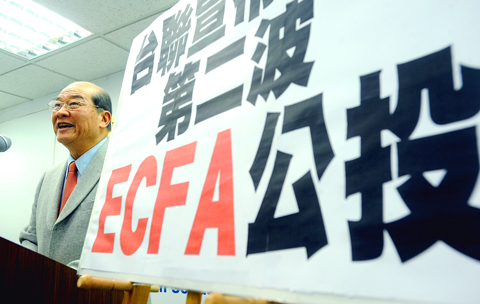The Executive Yuan’s Committee of Appeal has upheld the Referendum Review Committee’s denial of a request from the Democratic Progressive Party (DPP) to put the government’s planned economic cooperation framework agreement (ECFA) with China to a referendum.
If the DPP refuses to accept the decision, it could appeal to the Taipei High Administrative Court within two months.
Committee of Appeal chairman Chen Ter-shin (陳德新) refused to comment on the case yesterday, referring questions to the written decision posted on the commission’s Web site.

PHOTO: LIN CHENG-KUN, TAIPEI TIMES
DPP PROPOSAL
The DPP wants a referendum to ask the question: “Do you agree that the government should put the ECFA that Taiwan plans to sign with China to a referendum?”
The Referendum Review Committee turned down the petition by a vote of 13 to 4 with two abstentions on Aug. 27 last year.
The Committee of Appeal said it considered the rationale behind the Referendum Review Committee’s decision valid — that voters cannot express their approval or disapproval of the proposed ECFA because it lacks substantial content.
QUESTION OF CONTENT
“The substantive content of the ECFA will be decided by [ongoing cross-strait] negotiation,” the decision states.
“The content is still under deliberation and thus it is unclear. Given that, it is not a subject to ask people their opinions about,” the decision states.
In its appeal, the DPP objected to another reason given by the Referendum Review Committee — that the referendum subject did not fall under one of the four categories applicable for a national referendum: Referendum of laws, initiative of legislative principles, initiative or referendum of import policies, or referendum to amend the Constitution.
The DPP said in its appeal that the ECFA, which concerns the economic sovereignty of the country and major rights and obligations of the people, was a matter of initiative of legislative principles and a matter of important policies.
BIAS CLAIM
Saying that the question it asked was more concrete and clearer than the two previous referendums initiated by the Chinese Nationalist Party (KMT), the DPP said the Referendum Review Committee had been prejudiced in making its decision.
The first KMT-initiated referendum referred to was held in January 2008 and asked voters if they would agree to authorize the legislature to investigate officials suspected of corruption.
The second one was held in March 2008 and asked voters if the nation should apply to return to the UN under the name “Republic of China” or any other practical and dignified title.
The Committee of Appeal also sided with the Referendum Review Committee on this point, saying there was no comparison between the DPP’s proposal and the previous referendum subjects.

A preclearance service to facilitate entry for people traveling to select airports in Japan would be available from Thursday next week to Feb. 25 at Taiwan Taoyuan International Airport, Taoyuan International Airport Corp (TIAC) said on Tuesday. The service was first made available to Taiwanese travelers throughout the winter vacation of 2024 and during the Lunar New Year holiday. In addition to flights to the Japanese cities of Hakodate, Asahikawa, Akita, Sendai, Niigata, Okayama, Takamatsu, Kumamoto and Kagoshima, the service would be available to travelers to Kobe and Oita. The service can be accessed by passengers of 15 flight routes operated by

MORE FALL: An investigation into one of Xi’s key cronies, part of a broader ‘anti-corruption’ drive, indicates that he might have a deep distrust in the military, an expert said China’s latest military purge underscores systemic risks in its shift from collective leadership to sole rule under Chinese President Xi Jinping (習近平), and could disrupt its chain of command and military capabilities, a national security official said yesterday. If decisionmaking within the Chinese Communist Party has become “irrational” under one-man rule, the Taiwan Strait and the regional situation must be approached with extreme caution, given unforeseen risks, they added. The anonymous official made the remarks as China’s Central Military Commission Vice Chairman Zhang Youxia (張又俠) and Joint Staff Department Chief of Staff Liu Zhenli (劉振立) were reportedly being investigated for suspected “serious

ENHANCING EFFICIENCY: The apron can accommodate 16 airplanes overnight at Taoyuan airport while work on the third runway continues, the transport minister said A new temporary overnight parking apron at Taiwan Taoyuan International Airport is to start operating on Friday next week to boost operational efficiency while the third runway is being constructed, the Ministry of Transportation and Communications said yesterday. The apron — one of the crucial projects in the construction of the third runway — can accommodate 16 aircraft overnight at the nation’s largest international airport, Minister of Transportation and Communications Chen Shih-kai (陳世凱) told reporters while inspecting the new facility yesterday morning. Aside from providing the airport operator with greater flexibility in aircraft parking during the third runway construction,

American climber Alex Honnold is to attempt a free climb of Taipei 101 today at 9am, with traffic closures around the skyscraper. To accommodate the climb attempt and filming, the Taipei Department of Transportation said traffic controls would be enforced around the Taipei 101 area. If weather conditions delay the climb, the restrictions would be pushed back to tomorrow. Traffic controls would be in place today from 7am to 11am around the Taipei 101 area, the department said. Songzhi Road would be fully closed in both directions between Songlian Road and Xinyi Road Sec 5, it said, adding that bidirectional traffic controls would